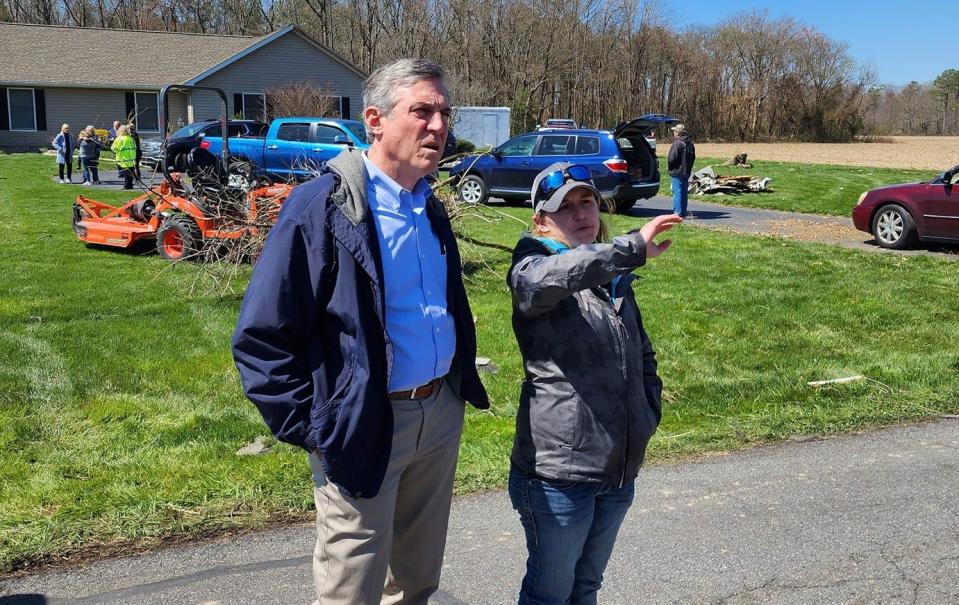Tips for dealing with insurance following Delaware's tornado and storm damage
In the aftermath of Delaware's strongest tornado in over 60 years that devastated a 14-mile stretch of Sussex County between Bridgeville and Ellendale, many homeowners are coping with property damage.
Here are some things to keep in mind when working with insurance companies and contractors.
More: Follow Sussex tornado's 14.3-mile path on our map. Homes and lives wrecked in 20 minutes.
Working with your insurance company
If you suffer property loss or damage, your insurance company should inspect the property before an agreement is made on the cost of permanent repairs. Some insurers have a specific window within which they can be reached after damage, so make sure to contact them as soon as possible.
Tips for a quicker claims process:
Do NOT make any permanent repairs to your property before speaking with an insurance adviser. Make only temporary fixes like covering broken windows or walls, if you can.
Take plenty of photos and videos of the damage showing as much detail as possible.
Save all receipts, including for any temporary repairs made.
Save damaged items, if possible, so an insurer can inspect them.
Make sure your insurance policy accurately describes your home. Check the square footage, number of rooms and any improvements that have been made to the property.
Usually, a home inventory list is requested by insurance companies to cover damages. Along with detailed photos and videos of damaged items, include the brand name, model, serial number, date of purchase and approximate value of items if possible.
More: Delaware tornado victim identified as 78-year old Daniel Bawel of Greenwood
Insurers usually prioritize customers with the most damage. Make sure to provide an accurate description of property damage and explain any special needs of your family. Also, ask when you can be expected to be met with an insurance adjuster and see if you can request the contact information for the adjuster and their supervisor.
When speaking with insurance companies, keep track of everyone you speak to including their name, title, contact information, date and time you spoke with them and the issues discussed. This should help ease the claim filing process.

How does the process work?
After losses are reported, an insurance adjuster will make an assessment of the damage to the property. This documentation will be sent to the insurer to determine the claims settlement, or how much you will get paid to fix the damage. More than one check may be provided depending on the extent of damage to the property.
You can also sign up for text message alerts to stay notified on the status of your claim.
If there is a mortgage on your home, the payment for structural damage may be made payable to you and your mortgage lender. The mortgage lender may put that money into an escrow account and pay for the repairs as the work is completed.
More: Tornado guide: tornado watch vs. warning, emergency supplies and alerts, and more
One option for filing claims is signing an Assessment of Benefits, which allows a third-party contractor like a plumber or roofer to work with the insurance company directly without the policyholder's involvement. There are certain risks when signing an AOB because you are essentially cut out of negotiations, so making sure the repair company is trustworthy is imperative.
If you have questions or concerns about your insurance companies' actions, you can contact the Delaware Department of Insurance Consumer Services Division at 302-674-6227 or via email at consumer@delaware.gov.
How to protect from fraud
After damaging storms, fraudulent behavior in relation to insurance becomes more frequent.
Scammers will knock on doors falsely claiming that they are with an insurance company and try to get homeowners to sign repair contracts. This oftentimes leads to residents being charged too much and getting subpar repairs, if any at all.
More: Scammed by a contractor? You're not alone. Why home improvement fraud is so hard to prove
To avoid scams, it's best to do business with local or trusted companies whose references can be corroborated by friends or neighbors. Your insurer may also have recommendations for contractors. Getting multiple bids on projects is also helpful.
Delaware residents who encounter fraud related to storm damage can contact the Fraud Protection Bureau at 800-632-5154 or 302-674-7350, or via email at fraud@delaware.gov.
What insurance covers and doesn't cover?
Short answer: It depends.
Homeowners' insurance covers damages from most hazards like tornadoes, hurricanes, severe storms, fire, wind and heavy rain. It will also pay to repair the structures of properties up to their insured amount as well as detached structures like a garage or shed, usually around 10% of the main structure's insured amount.
Typically 50%-70% of your home's structure is insured. Landscaping elements like trees and shrubs are usually reimbursed at around $500 per item.
What isn't covered by homeowners' insurance is damage from flooding and earth movement (earthquakes, mudslides, landslides, sinkholes, etc.). Protection from these hazards usually requires a separate policy from a private insurer or the National Flood Insurance program. Separate coverage must be purchased to cover your possessions.
If your personal property losses are not covered by your insurance, they can still be deducted only if the disaster is federally declared by the Federal Emergency Management Agency (think named storms like Hurricane Ida). For these deductions, you must subtract $100 from each loss before adding them up and the total must be more than 10% of your adjusted gross income.
Community resilience: As Sussex County recovers from tornado damage, here's how to help those in need
Contact Molly McVety at mmcvety@delawareonline.com. Follow her on Twitter @mollymcvety.
This article originally appeared on Delaware News Journal: How to navigate insurance claims and fraud after storms

